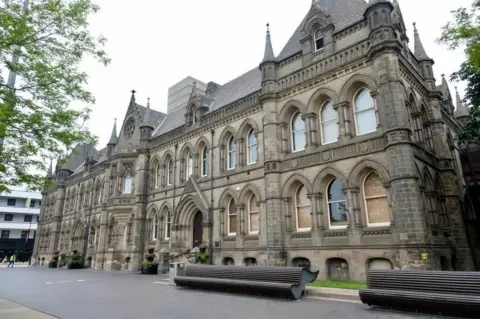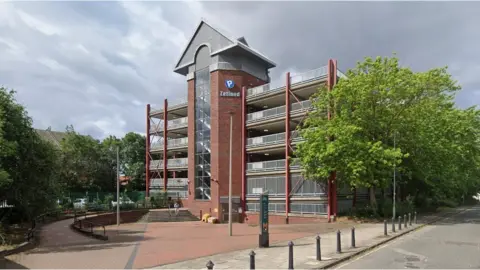Middlesbrough Council: Bankruptcy fears behind sell-off plans
 BBC
BBCMiddlesbrough Council is set to sell off a raft of buildings while hiking up charges to the public in an effort to avoid bankruptcy.
Plans would see the long-term future use of the Town Hall questioned and buildings and assets, including community centres and car parks, sold.
Licence fees, parking and service charges could also increase.
The plans were drawn up in response to a forecast multimillion-pound overspend and "critically" low reserves.
A recent report to the council's executive board revealed a forecast overspend of more than £8.5m against its approved budget for the second quarter of the financial year.
Without action, it said the authority's "fragile" financial position could lead to Middlesbrough Council being forced to issue a section 114 notice, effectively declaring it bankrupt.
Other councils to have issued such notices include Croydon Council, and more recently, Birmingham City Council. Nottingham considered issuing one on Tuesday.
Which assets could be affected?
An asset review report from the council's directors of regeneration and finance said proposed sales could bring in an estimated £33m, but would also see a reduction in long-term income of £1m a year.
The report asks the authority's executive to consider:
- The long-term use of the Town Hall and whether it justifies on-going investment
- Closure of Middlesbrough House, with staff relocated
- Closure of the Multi Media Exchange, relocating Middlesbrough Community Learning to the Cleveland Centre
- Sale of Hemlington's Viewley Centre, relocating children's services staff to other council buildings
- Disposal of Cannon Park car park for commercial redevelopment
- Disposal of Zetland Car Park and the Middlesbrough Municipal Golf Centre with covenants in place to secure their uses as a car park and golf club respectively
- Disposal of land east of Middlesbrough Municipal Golf Centre Driving Range and land on Stainsby Road, Acklam, for housing development
A letter to staff said, if approved, sales would take place between now and March 2027 to reduce the impact on services and maximise financial return.
Affected staff have been told no jobs would be lost if the report was approved.
 Google
Google
Analysis by political reporter David Macmillan
There has been a lot of speculation over the last few months about just how precarious the finances are at Middlesbrough Council.
And this latest strategy to try and deal with the crisis comes with risks.
Selling things like a golf course or car park would bring in funds but it hurts the council's ability to generate revenue in the future.
Raising fees for attractions and services could be counter-productive, in an area where the people don't have much spare cash to spend.
Many local authorities are going through financial turmoil right now, but there are local problems which exacerbate the situation facing Middlesbrough Council.
There is a high rate of children being taken into care in Middlesbrough, the costs of which are both expensive and unpredictable.
And there is hardly an abundance of posh houses in the town - that makes it difficult to raise funds through council tax.
There were warnings from the local authority in August that it may need to issue a section 114 notice, the council equivalent of a declaration of bankruptcy.
That hasn't happened - yet - but the threat very much remains. Some may view this latest plan as the proverbial last roll of the dice to avoid that fate.

Nicky Walker, executive member for finance and governance, told the Local Democracy Reporting Service the review was necessary due to "the critically low level of reserves" inherited from the last financial year, as well as the need to set a balanced budget and fund a transformation of services set out by an external auditor.
The proposals also include rises in charges, licences, fines and parking costs.
For example, there would be an almost 9% increase for the hire of the town hall, HMO licences, land hire fees for events and annual season tickets for parking off street and in the Zetland and Station Street car parks.
Fines for fly-tipping could increase from £400 to £1,000 and littering fines from £80 to £500.
Why is there an expected overspend?
A range of factors are being blamed for the forecasted overspend, including rising cost and demand for several services, most significantly in children's social care where the predicted increase is £3.1m.
A report to the executive said challenging economic conditions and the cost-of-living crisis was having an impact on the council, with "continuing high levels of inflation" a significant factor in the authority's financial position.
It said: "This has significantly increased the costs of service delivery including energy, utilities, fuel, and food, and also staff costs as a result of the national pay award which has recently been agreed for all local government employees for 2023-24."
The council has also incurred increased costs from external service providers in areas such as social care, waste disposal and providing temporary accommodation.

Follow BBC Tees on Facebook, X (formerly Twitter), and Instagram. Send your story ideas to [email protected].
